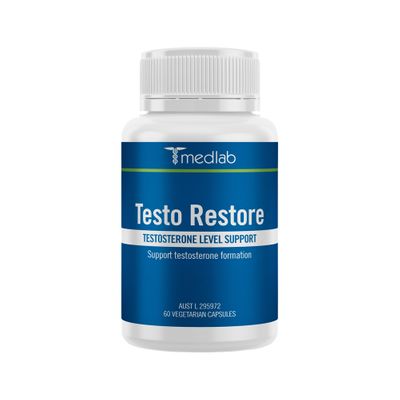Medlab Clinical
Medlab Testo Restore 60vc
Also found in:
DISCONTINUED Read more
Product Description
Medlab Testo Restore 60vc
An evidence-based formulation designed to increase free testosterone levels and support muscle strength and recovery. The active ingredient in Testo Restore has been shown to increase free testosterone and Insulin Like Growth Factor-1 (IGF-1), in a Placebo-controlled clinical trial, in healthy men. IGF-1 and testosterone support muscle function and physical performance. Exercise and excess perspiration increases the demand for zinc and magnesium, which are involved in muscle repair and recovery. Through providing these nutrients, Testo Restore may support muscle strength and enhanced recovery from exercise. Zinc plays a role in androgen metabolism and interaction with steroid receptors. It is essential for the regulation of cellular growth and tissue repair. Magnesium supports energy production, normal neuromuscular function and may assist with sleep quality.
Ingredients
|
ACTIVE INGREDIENTS |
Each Capsule Contains |
|
|
Zinc (from Zinc Diaspartate, Zinc Methionine Sulfate and Zinc Oxide) |
8.89 mg |
|
|
Magnesium (from Magnesium Aspartate and Magnesium Oxide) |
124.185 mg |
|
|
Vitamin B6 (from Pyridoxine Hydrochloride) |
3.12 mg |
|
| Excipient Ingredients
Hypromellose Cellulose Magnesium stearate |
||
Cautions
WARNINGS
- Vitamin supplements should not replace a balanced diet. Contains zinc - may be dangerous if taken in large amounts or for a long period.
INTERACTIONS
- Magnesium > Biphosphonates (Alendronate, clodronate, etidronate, ibandronic acid, Risedronate, Tiludronate) Magnesium may interfere with absorption of biphosphonates. Magnesium supplements should be taken at least 4 hours before or 2 hours after taking these medications to minimize potential interference with absorption.
- Magnesium > Antibiotics (Tetracyclines, Quinolones) Magnesium may form insoluble complexes with quinolones and tetracyclines and interfere with their absorption. Magnesium supplements should be taken at least 4 hours before or 2 hours after taking these medications to minimize potential interference with absorption.
- Magnesium > Gabapentin (Neurotin) (Neurotin) Magnesium may interfere with gabapentin absorption. Magnesium supplements should be taken at least 4 hours before or 2 hours after taking this medication to minimize potential interference with absorption
- Magnesium > Calcium channel blockers Theoretically, magnesium may have additive effects with calcium channel blockers. Caution is recommended when combining with high dose magnesium supplementation.
- Zinc >Antibiotics (Tetracyclines and Quinolones) Zinc can form complexes with Tetracyclines and Quinolones in the gastrointestinal tract, which can reduce absorption of both the tetracycline and zinc when taken at the same time. Zinc supplements should be taken 4 hours before, or 2 hours after these medications to minimize potential interference with absorption.
- Zinc > Antibiotics Cephalexin (Keflex) High doses of zinc (250mg) may decrease cephalexin levels by interfering with intestinal absorption. Zinc supplements should be taken 4 hours before, or 2 hours after these medications to minimize potential interference with absorption.
- Zinc > Penicillamine (D-penamine) Zinc forms an insoluble complex with penicillamine, and may interfere with absorption. Zinc may reduce efficacy of low dose penicillamine. Zinc supplements should be taken 4 hours before, or 2 hours after these medications to minimize potential interference with absorption.
- Zinc > hypoglyceamic medications Theoretically, zinc can have additive effects in patients treated with hypoglyceamic medications; use with caution, dose adjustments may be warranted, under professional recommendation.
- Zinc > Amiloride Amiloride has a zinc sparing effect, reducing urinary zinc excretion. Use caution with high dose zinc supplementation.
- Vitamin B6 > Phenobarbitione Preliminary research suggests that vitamin B6 (pyridoxine) 200 mg daily can reduce plasma levels of phenobarbital, possibly by increasing metabolism. It is not known whether lower doses have any effect. Avoid high doses of vitamin B6 (pyridoxine)
- Vitamin B6 > Phenytoin Preliminary data suggests that vitamin B6 (pyridoxine) 200 mg daily can reduce plasma levels of phenytoin, possibly by increasing metabolism. It is not known whether lower doses have any effect. Advise people taking phenytoin to avoid high doses of vitamin B6 (pyridoxine).
For the most up to date information on this product, please visit the brand / manufacturer website as product descriptions and directions can change.
Medlab Biotic Jnr. 60g
DISCONTINUED
Medlab CurcuGuard 500
DISCONTINUED
Medlab Mg Optima Relax Lemon Lime Sachet 5g x 10...
DISCONTINUED
Medlab NanoCelle D3 Plus K2 30ml
OUT OF STOCK
Medlab StemGuard Choc Peppermint 98g
DISCONTINUED
Medlab Testo Restore 60vc
DISCONTINUED
Medlab W8Biotic Strawberries and Cream 350g
DISCONTINUED









